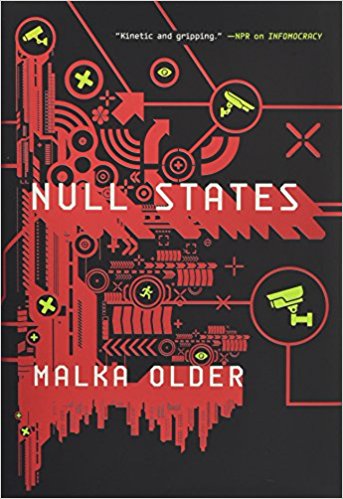You have /5 articles left.
Sign up for a free account or log in.
 Null States: A Novel (The Centenal Cycle) by Malka Older
Null States: A Novel (The Centenal Cycle) by Malka Older
Published in September of 2017.
In my review of Infomocracy, the first book in Malka Older’s Centenal Cycle, I wrote that the book was the "science fiction political election thriller that we didn’t know that we were waiting for.”
Null States, the second book in the series, is the warning about the limits of big data driven decision making that we don’t quite understand that we need.
I count myself as amongst those in higher education who are obsessed with analytics. We think that the key to improving postsecondary productivity is data. Early warnings of students at risk for failing their courses will be detected early enough for targeted interventions. Course design to maximize long-term student learning will be informed by long-term evidence across a range of outcomes. Flawed evaluative instruments, such as course evaluations, will give way to detailed longitudinal data on student success.
The world that Malka Older is building in her Centenal Cycle takes a data-driven world to its logical political conclusions.
In the late 21st century the backwards practices geographically contiguous nation states has largely been replaced by micro-democracies. Citizens of small geographic areas called Centenals are represented by the worldwide government of their choice. Options range from corporate governments such as PhillipMorris, single issue governments such as SavePlanet, and broad coalitions such as Policy1st.
The micro-democratic system of world government is managed and overseen by an all encompassing organization called Information. Information is what happens when the Google’s and Facebook’s and Microsoft’s and Amazon's merge - and then merge again with the United Nations, the NSA, and the European Union.
The twist is that Information is not a malevolent force, much like how the impact of Google and Amazon on our society and culture and economy cannot be described in simplistic terms.
Information, the organization, seeks to inform all citizens with accurate data to make informed decisions. The mission of Information is to collect and expose as much data to everyone as possible, with the idea that these data enable policy and political decisions that are informed by evidence.
In practice, this means cameras (or feeds) are as ubiquitous worldwide was they are in London today - with the difference being that everyone in the world can watch a feed at any time. Predictably, the interface to Information has moved by the late 21st century from handheld screens to eyeballs. Retina implants or some such thing allows everyone to watch video and read news without the pesky need to carry around a smartphone.
So far, I have not talked about what actually happens in Null States. That is because not all that much happens in Null States. There is a mission to a new micro-democracy in the DarFur, a political assassination and investigation, and some light espionage against a possibly rogue former Supermajority government.
The lack of action in the book is mostly compensated by the Malka Older’s fascinating exercise in worldbuilding, and by her commitment to populating this world with compelling characters. The book picks up when Mishima, the bad-ass intelligence analyst with a useful narrative disorder and deadly martial arts skills, gets into the action about halfway through the novel. Let’s hope that Mishima is the star of the third book in the cycle.
My wish for more spying and fighting should not dissuade fans of Infomocracy from reading Null States.
This is a series of books that forces us to ask some inconvenient questions about where our love of analytics will eventually take us.
A science fiction / election thriller - even one like Null States with less thrills than I’d prefer - is a good stimulant for creative thinking about our current obsession with big data and our acceptance of the proliferation of public surveillance.
What are you reading?
Ps. Is it too late to add Null States as a candidate to Bryan Alexander’s online book club?




